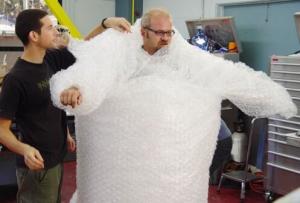California Supreme Court: No Dubon Review
Hello, dear readers!
So here we are – another week gone. And, after being tricked intro drinking coffee with salt instead of sugar, after having your desk covered in post-it notes, and after being misled into buying workers’ compensation insurance for your pet dog, you’re finally ready for some good news.
Well, leave it to your humble blogger to bring you some!
So, from the looks of it, the California Supreme Court won’t be chiming in on Dubon, and the decision looks like it’s going to stand, at least for now.
As you will recall, Dubon, that en banc WCAB opinion which ultimately held that, unless UR is untimely, it HAS to go to IMR, is not the only case that challenges the absolute exclusivity of the UR-IMR procedure. The case of Stevens v. WCAB is likewise working its way to the Court of Appeals’ decision desk, with Mr. Stevens seeking to establish that Workers’ Compensation Judges should have jurisdiction over the validity of UR and IMR.
Now, while we in the defense community might all dance in the streets at the idea that, for a bit longer, at least, there’s no adverse decision on the question of the validity of IMR, there’s a bit of frustration everywhere else.
Treating physicians are certainly upset that they can’t get authorization for all the treatment they would like to perform (and bill for). And, of course, applicant attorneys are upset that they can’t get more and more treatment for their clients, whether for the sake of the treatment itself or just for the ability to drive up costs for defendants as a means of leveraging higher settlement amounts.
Now, as much as your humble blogger is a cold, heartless defense attorney, I can’t help but agree with some of the sentiments of the anti-IMR crowd. It’s horrible when UR denies home modification on the basis that the UR reviewer would not have authorized a wheelchair in the first place. It’s horrible when UR denies an MRI for the back because the knee has not been admitted as an injury (that’s not a typo dear readers, and no, I’m not making these ones up). It’s horrible when UR refuses to authorize Scotch injections for a spiritually and morally crushed but physically health workers’ comp blogger (that one might actually be made up).
But, you know what else is (arguably equally) horrible? The abuse employers and insurers receive in California’s workers’ compensation system. Employers are forced to provide sleep number beds. Employers are forced to provide treatment for non-industrial conditions just to make industrial treatment feasible. Neither temporary disability nor medical treatment benefits are subject to apportionment. We’ve seen insurers with just a few days of coverage be stuck with the entirety of a career-spanning CT.
At the moment, it looks like the only two possible scenarios are those in which one of the parties is left very unhappy – either employers are forced to provide treatment of questionable reasonableness and necessity, or employees are deprived of reasonable and necessary treatment on questionable grounds. The legislature is clearly not content to leave decisions in the hands of the Administrative Law folks, and the Administrative Law folks aren’t happy leaving the decision in the hands where the legislature placed it.
We need another solution, and quick. Your humble blogger’s ideas have been roundly rejected, including (1) have all jobs done by robots that are specifically programmed not to rebel against humanity; (2) tell all employees to stop getting injured at work; and (3) wrap all employees in thick layers of bubble-wrap prior to sending them out to do the day’s tasks.
What are your ideas?


